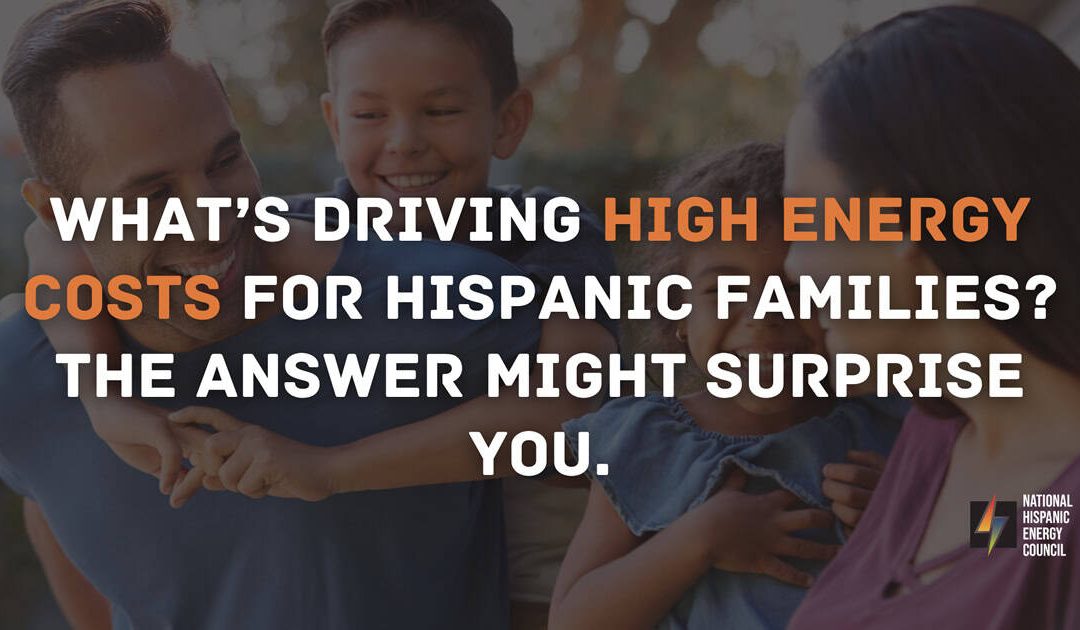Energy costs in America are rising — but for many Hispanic households, they’ve been high for a long time. Today, these families spend more of their income on energy bills than almost any other group. This isn’t just about high prices — it’s the result of policies that often overlook the people most affected.
In 2024, Hispanic households faced an energy burden 24% higher than the national average — meaning they spend a larger share of their income on utilities than other Americans. This puts a major strain on household budgets, especially for the Hispanic Americans who live at or below the poverty line
Understanding the Energy Burden
The energy burden is the share of a family’s income that goes toward paying energy bills — like electricity, natural gas, and water. Experts say that anything over 6% is considered high. When families are forced to spend more, they’re often making difficult trade-offs: choosing between heating their homes and buying groceries, or skipping essential prescriptions to keep the lights on.
This burden is not about energy use — it’s about systemic factors:
- Outdated infrastructure in predominantly Hispanic communities.
- Policies that limit fuel choice, like bans on natural gas.
- A lack of support for renters to improve energy efficiency.
- Education barriers to energy assistance programs.
Energy Policy Is Economic Policy
The Hispanic population is not just a consumer base. It is a driving force in the American economy.
- In 2022, the U.S. Hispanic economy reached $3.6 trillion — making it the fifth-largest economy in the world.
- Hispanic workers accounted for 17% of the U.S. manufacturing workforce, and about 18% of the clean energy workforce, contributing across industries from renewables to nuclear to natural gas.
When energy becomes more expensive, it does more than strain households — it undermines economic opportunity, job growth, and the path to upward mobility. Energy policy is economic policy. When bills go up, families suffer.
Why Energy Policies Matter
Many energy policies today assume a one-size-fits-all approach. But what works in a large city might not work for a rural or working-class Hispanic community.
For example:
- Natural gas remains a lifeline for many families. On average, homes using gas for heating and cooking save $1,132 per year compared to electric-only households.
- Yet, some regions are passing policies that ban natural gas hookups, pushing families toward more expensive electric-only systems and removing consumer choice.
- Families in hot states like Arizona, Texas, and Florida rely heavily on cooling — and can’t afford mandates that increase energy prices without offering alternatives.
Fuel choice empowers individuals to select what works best for their budget, climate, and community. Choice fuels opportunity. We deserve to choose how we power our lives.
Investing in Necessary Infrastructure
Too many low-income and minority neighborhoods are stuck with outdated energy infrastructure that results in higher costs and less reliable service. Meanwhile, modern energy projects often face years of delays due to federal permitting reviews.
- Transmission projects take an average of 6.5 years to clear environmental reviews
- Clean energy installations face over 4.5 years of approval time, slowing their deployment and access
Infrastructure investment isn’t just an energy issue — it’s an equity issue. Energy equity means better infrastructure where it’s needed most.
From Burden to Opportunity
Energy shouldn’t be a burden — it should be a path to prosperity.
Hispanic workers are already building America’s energy future. But families deserve policies that protect their homes and expand their role in the energy economy.
With thoughtful policies and inclusive decision-making, we can ensure:
- Access to affordable energy for every household
- The right to choose energy sources that fit local needs
- Investments in infrastructure that modernize communities
- Training and hiring programs that bring more Hispanic workers into high-paying energy careers
Good energy jobs are the key to generational progress.
Let’s Act — Together
Energy isn’t just a utility bill. It’s tied to housing, healthcare, education, and financial stability. Hispanic communities deserve to be at the table — not just in energy conversations, but in shaping the future of our energy economy.
Let’s make energy equity a reality — not a talking point.
